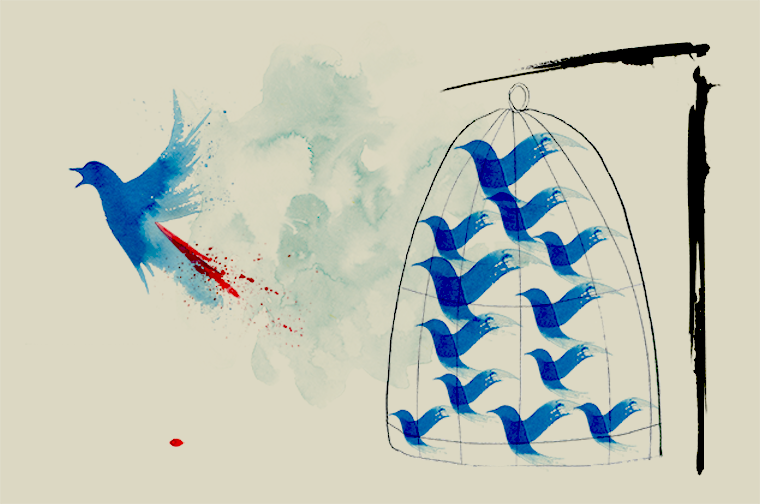
How Twitter is gagging Arabic users and acting as morality police
Twitter’s behavior reflects an unspoken policy of protecting public figures from criticism.

In 2011, Twitter was a platform that helped keep people informed on politics and news from the ground. In Egypt, It was also a platform that amplified the voices of local dissidents who were part of the revolution. With live updates posted by many Egyptian users, people from around the world flocked to Twitter to witness live many of the events and updates coming from Egypt.
Today, Twitter has a different story, and it is not one of speaking truth to power. Twitter is no longer empowering its users. Its platform cannot be considered neutral. Twitter’s actions suggest it is systematically suppressing voices in the Middle East and North Africa (MENA) region.
What started out as an investigation into the mass suspension of accounts of Egyptian dissidents, uncovered a mass censorship algorithm that targeted users who use Arabic flagging their text as hateful conduct. This story is still unfolding. As you read this, mass and unjustified systemic locking and suspension of Twitter Arabic accounts continues. Users are angry and bewildered.
Why now?
The timing is not accidental. Political engagement on Twitter peaked recently after Mohamed Ali, actor and contractor turned whistle blower, revealed corruption in Egypt’s military in early September. More recently he released a 30 September video calling for protests the next day at 3pm.
We’ve got a newsletter for everyone
Whatever you’re interested in, there’s a free openDemocracy newsletter for you.
What follows suggest that Twitter has subsequently suspended accounts critical of the Egyptian government. Moreover, draconian yet lazy algorithms have systematically shut down voices of dissent – and pulled unsuspecting social media users down with them.
The effects of these suspensions was not just hiding a set of tweets critical of the government, but completely disabling the influence network of Egypt’s dissidents. This is potentially the first documented politically motivated mass shutdown of twitter accounts at a time when online interaction was high and translated to possible action on the ground. This is what Twitter was dedicated to avoiding as it opened a branch in the UAE.
While accusations of complicity of Twitter in the MENA region are rampant, the data gathered does not conclusively prove that an intervention at Twitter caused this, although it is highly likely. This is also because the data was partial. Indeed, these accusations are not limited to Egypt but the entire region who have a sense that being critical of their governments was met with punitive measures by Twitter against them.
Twitter did not respond to a question about how many Twitter accounts were suspended in the period we cover here, or whether there has been pressure from any Arab government.
Technology will always reproduce the biases of those training the system. What you are about to read reveals that many of those suspensions had a common denominator: being critical of the Egyptian government.
Mass suspensions
It started on 1 October, @Ganzeer, the well-known Egyptian graffiti artist, tweeted about his suspension. A string of complaints about unexplained suspensions followed. Analysis of Twitter threads revealed an overwhelming number: up to 150 accounts that claimed to have been suspended across just one week.
Ganzeer was given the following reasons:
- Using a trending or popular hashtag with an intent to subvert or manipulate a conversation or to drive traffic or attention to accounts, websites, products, services, or initiatives; and
- Tweeting with excessive, unrelated hashtags in a single Tweet or across multiple Tweets.
This Twitter rule did not apply to @Ganzeer’s tweets but more worrisome were many others who were suspended without even an excuse.
@SamiaRaoof, @DaliaNewYork and @elnggar_said, @iRafla were suspended around the same time. They later received emails that their accounts were suspended by mistake, some of them fairly quickly and others much later.
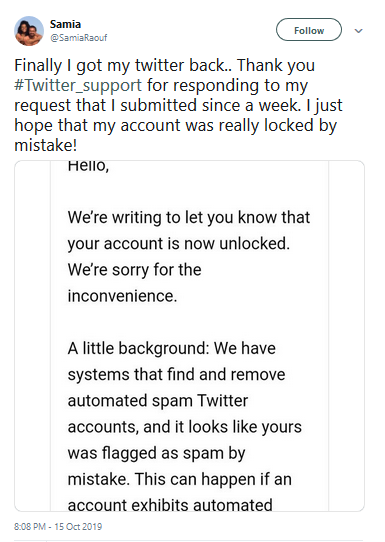
Many, like @Cairo67Unedited, a verified Twitter user, were baffled by the suspensions.
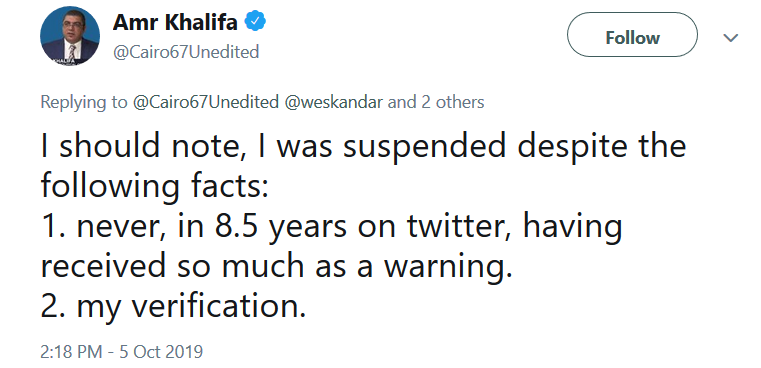
The suspensions seemed to have happened around late September and lasted from one day to a few days. In many cases Twitter had responded that they had suspended the accounts by mistake. The accounts affected varied from having a few followers to hundreds of thousands.
Some researchers and I set out to verify which accounts were restored and which remained suspended. We wanted to understand why these suspensions were taking place. Speculations were that Twitter’s Middle East and North Africa (MENA) office faced pressure from Arab governments in order to curb the effect of social media dissidence.
These speculations come from a long history, starting form when it was revealed that the Saudis had a spy inside Twitter. Similarly, mistrust continued when a trending anti-Sisi hashtag disappeared suddenly in July 2018, and then later on in 2019. It didn’t help either to find that an officer in the British Army information warfare unit was head of editorial in Twitter for the MENA region.
An apology
The documentation of these accounts and the verification of some of their stories forced Twitter in the MENA region into an apology that offered no convincing cause or explanation.
It reads: Over the past period, while conducting routine checks on spam activities and other applications of Twitter rules, a number of accounts from Egypt were suspended by mistake. We apologize for that.

https://twitter.com/TwitterMENA/status/1182401453484322817
The apology came after many efforts from NGOs like EFF, SMEX and Access Now to get answers from Twitter. The apology was inaccurate. The accounts suspended were not just from Egypt. Accounts like @Ganzeer, @DaliaNewYork, @Cairo67Unedited and @Hend_Nafea were based in the US. Other accounts from the region were targeted and have been supportive of opposition to the Egyptian government.
More suspensions were happening after, on 6 October renowned literary author Ahdaf Soueif’s account was locked.
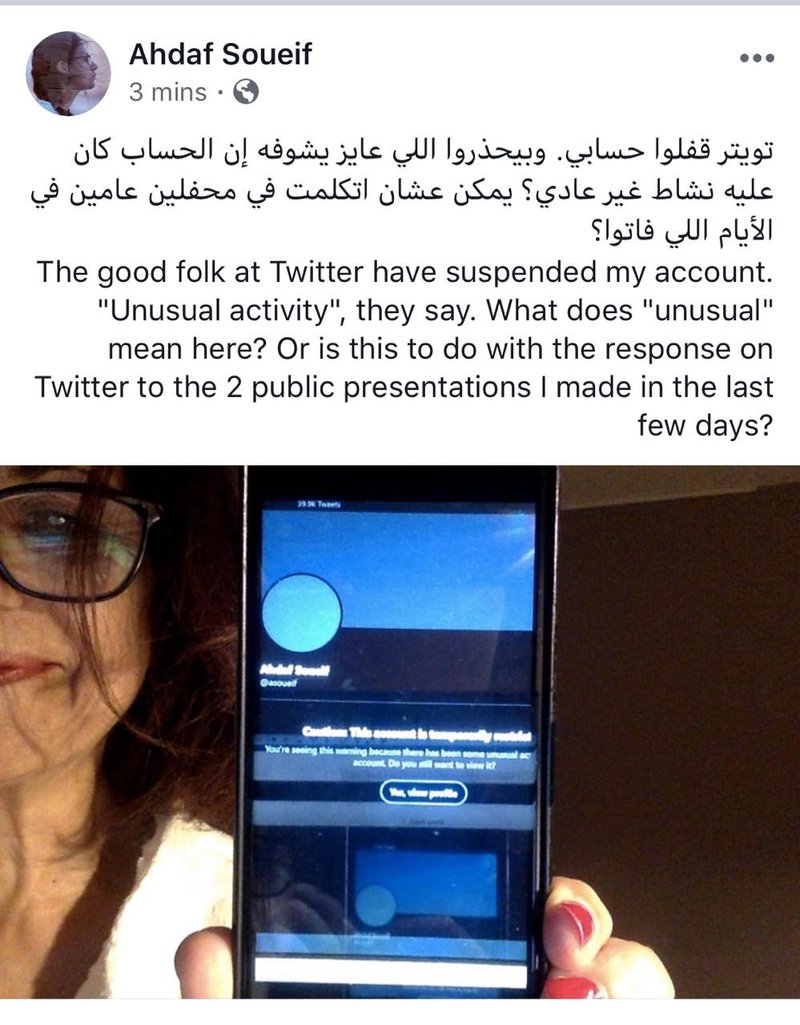
Twitter targets Arabic swear words as morality police
As we gathered more testimonies and documentation, we realized that some of the people claiming they were suspended were not back online, even after Twitter’s apology and opening up the appeals process. Appeals were constantly rejected.
I interviewed @OfficialAmro1, a user affected by mass suspensions with over 265K followers and 115K tweets. He was suspended without cause and added, “I don’t even curse.”
To which I foolishly replied, “Cursing would not suspend your account, particularly if directed against a public figure. Incitement will.”
“No, now it does,” he replied. He also added that if you criticize a figure loyal to the Arab regimes, you can get your account locked or suspended.
More people sent me their stories. This was staggering because many people had been in ‘Twitter jail’ for various reasons. It was then that I realized that there was other types of systematic Twitter suspensions happening over time and users’ Arabic tweets were marked as ‘hateful conduct’.
The 'hateful conduct' policy as defined by Twitter states: You may not promote violence against or directly attack or threaten other people on the basis of race, ethnicity, national origin, sexual orientation, gender, gender identity, religious affiliation, age, disability, or serious disease.
Analyzing the message contents that were flagged for hateful conduct I saw that most did not violate Twitter’s rules. Soon I began to discover that what @OfficialAmro1 had told me was true. The content I was seeing contained profanity. But that wasn’t the whole story.
Arabic curse words are used often. I sampled around a little under 50 claims, with over 30 screenshots that contain Twitter’s email identifying the violating tweet. It was clear that profanity alone was not causing the suspensions.
A few examples
One Twitter user @AElMassry was blocked for replying to one of his friends with the following: “A few ass kissers appeared during the time of the Muslim Brotherhood, became state loyalists with the appearance of the ass kisser.” Similarly @DaliaNewYork who lives in the United States was blocked on April 18th for an Arabic tweet that said “Tawadros(the Coptic pope) was an ass kisser”. (Dalia herself is Coptic)
Just the implication of an insult to a public figure can get your account locked or suspended. So when @mostafamahdi202 decided to accuse an Egyptian member of Parliament of being an hypocrite, he used a term that is not even a profanity, but a gentler term that sounds much like it, and Twitter deemed the criticism as hateful conduct. There’s a difference of a dot, but in pop culture it is a non-swear word that bears the same connotation.
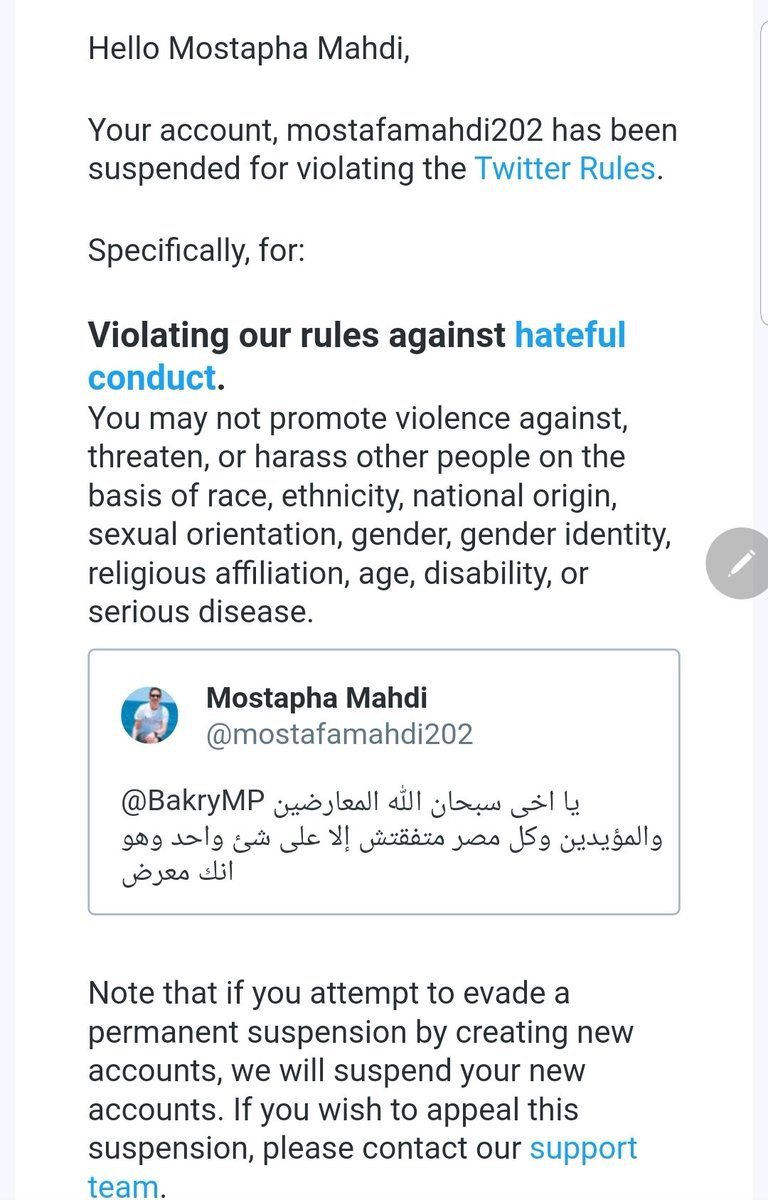
Translation: “Brother, behold, opposition and supporters and all of Egypt did not agree except to one thing, that you are a widener (widener here is a word that sounds like ass kisser)”.
Tragically funnier still are those who were joking around with their friends using their usual language that has profanities @ism3lawy_ ended up cursing Egypt’s Zamalek football club and for that his account was suspended permanently along with that of one of his friends. In a separate conversation, his friend @EHAB_M0 was also joking around with his friends and eventually got a permanent suspension.
And it’s not just insulting a football club that will land you in ‘Twitter jail’. When @YoussefAmr1907 tweeted: “The film is a son of a bitch and the central bank is a son of a bitch,” his account got suspended. For the record the movie he was insulting was Once Upon a Time in Hollywood.
Another account @Armed007, now permanently suspended responded once: “With all my love Mr. Gamal… Fuck you.”
It even had a little heart next to it.
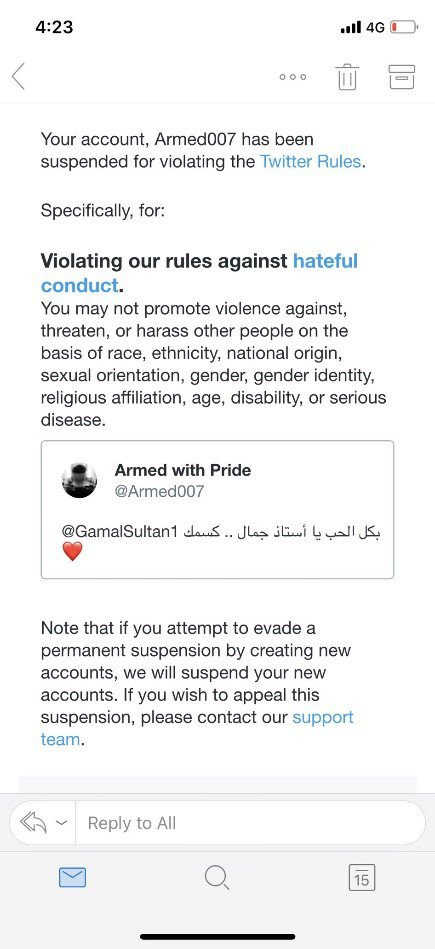
On a more serious note, here is one that should raise the alarm even for the morality police.
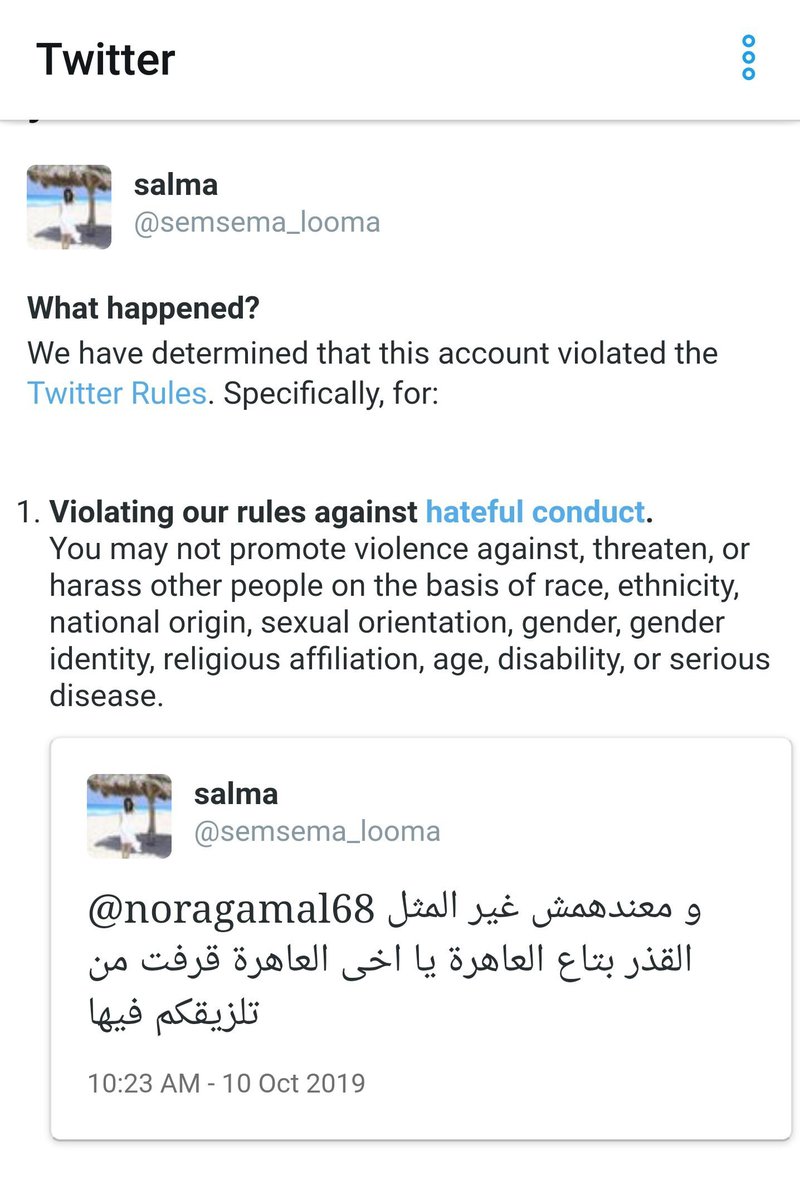
Here @semsema_looma responds to her friend by criticizing the use of ‘whore’ as a constant example. She says: “They have nothing but the filthy example of the prostitute. Even the prostitute has become sick of how much you stick to her.”
Analyzing the ‘ass-kissing’ effect
These suspensions almost always happen whenever the tweet is a reply to a user, even if the content does not address that particular user. But it’s not that straight forward. There seems to be more complex calculations.
I focused on the term 'ass kisser' or:
عرص
in Arabic, which is one of the lighter swear words and which has come up repeatedly in suspended text. The word itself has complex connotations in the Arabic language. Historically it means something close to ‘pimp’, but as time evolved it became a symbol of being dishonest and hypocritical towards someone or an entity. I translate it as ‘ass kisser’ because it has some of the profanity of the original word rather than hypocrite. For some time Egyptian president Abdel Fattah al-Sisi was also referred to as ‘The ass-kisser’, purely as an insult.
The more variations of the word you use in your replies, the more likely your account will be flagged for hateful conduct.
I tested my hypothesis. I chose the account @TwitterMENA to reply to, since it was a system account and would be able to most assess the policy and least likely to be misinterpreted as hateful conduct. I responded to one of their tweets saying “Stop your ass kissing, and stop suspending accounts for saying ‘ass kisser’ and ‘ass kissing’.”
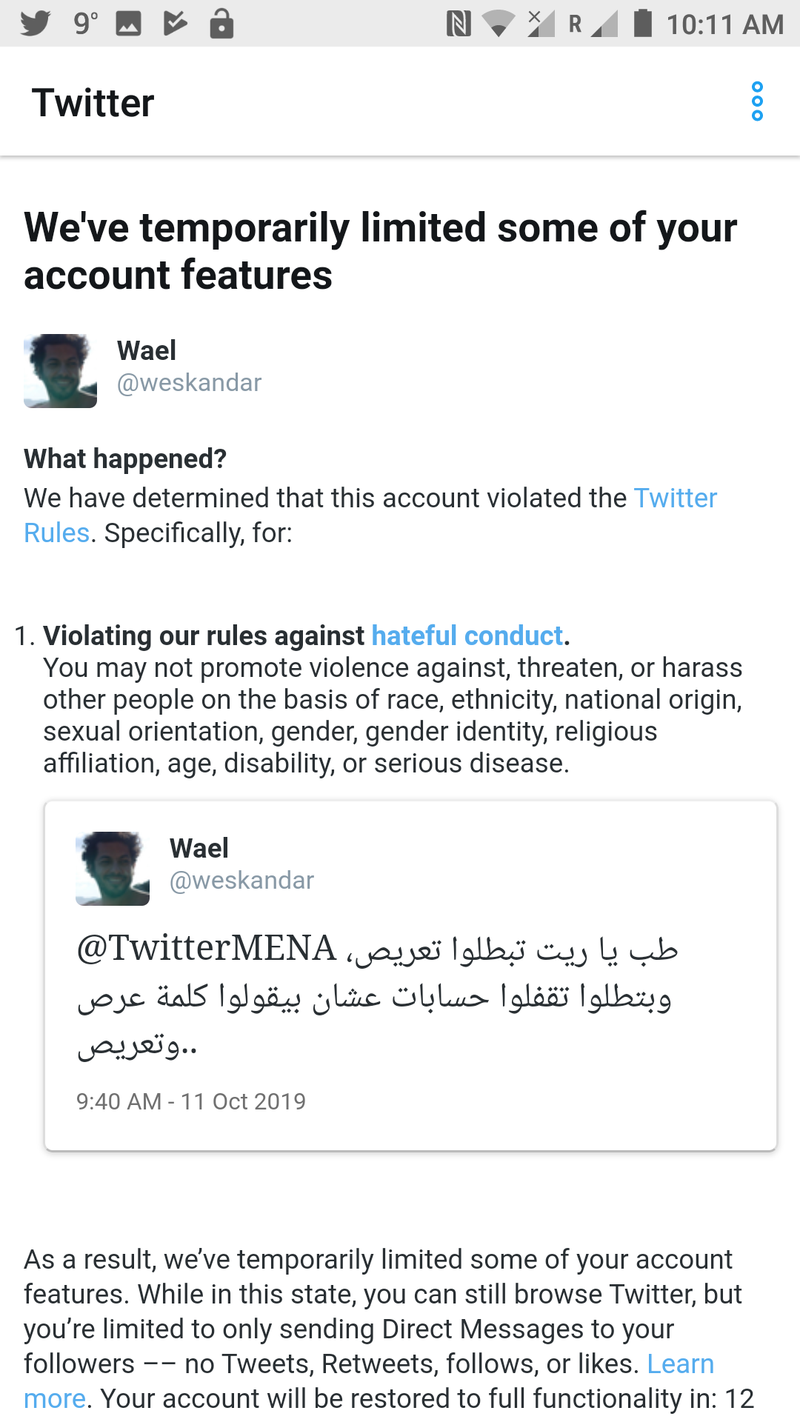
Within seconds of my post, the algorithm identified the curse words and locked my account for 12 hours. It was my first violation ever. The irony of documenting this as a reply to the platform’s account is probably lost on them.
Twitter gave me two options, to remove the tweet or appeal their decision. I appealed and the most dangerous and disconcerting of my findings is that the appeal system in Twitter for MENA is broken.
Tweeting several English translations did not lock or suspend users.
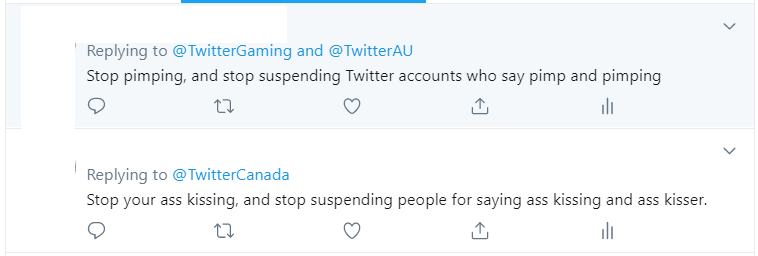
The results were communicated to Twitter through a request for comment by organizations who were in touch with them. Twitter did not respond to any of the findings.
Reckless algorithm
Even things like talking about prostitution can get you banned. Just like the example earlier, I tried it out with a new account.
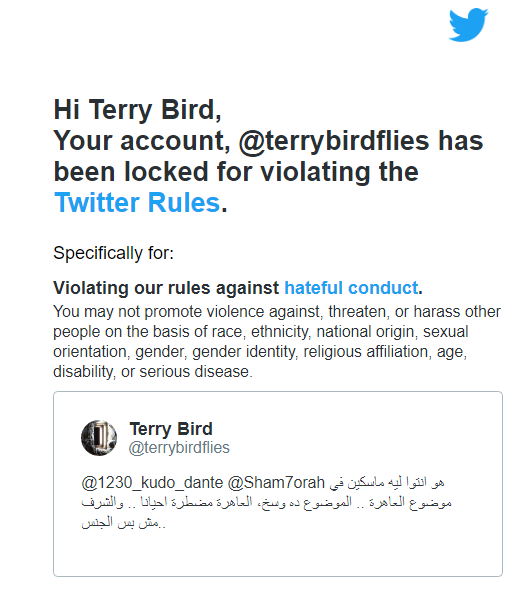
It reads: "Why are you fixated on the issue of prostitute, this is filthy, sometimes a prostitute is forced. Honor is not only about sex.”
It was flagged as hateful conduct. Any real conversation can be blocked by Twitter.
I discovered that the term ‘ass-kisser’ was targeted. The Arabic word is
عرص
and the docile Arabic term that looks a lot like it is
عرض
If you notice there isn’t much difference except for the dot on top one of the characters. One is pronounced `ars, the other is pronounced `ard. The word is often used when those using it don’t want to be seen as using swear words (even though now `ars is not that much of a swear word but a colloquial description of a political position). The word in itself means width or present, or show. It has many variations just like the original word ‘ass-kisser’.
All these words are blocked, even when they do not represent an insult, and users can find themselves permanently suspended without a pathway to an appeal.
For the final test, to test that an innocent word like `ard which means width has in fact been added to Twitter’s algorithm for Arabic and to make sure that they do count the words and that they don’t really look into appeals through their system, I left them this message.
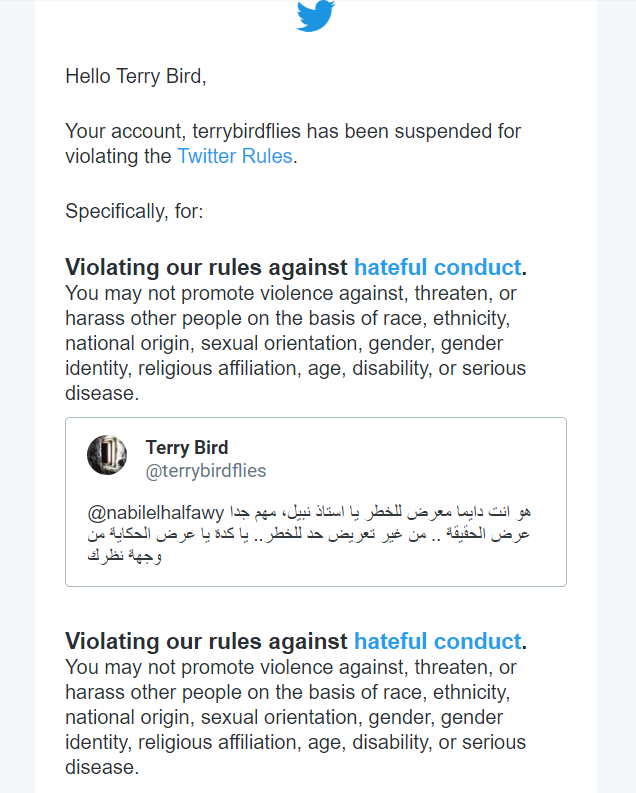
“Mr. Nabil, you are constantly exposed to danger, it's important that you reveal the truth without putting anyone in danger, either this or present the story from your point of view.”
Words in italics are the variations of the word `ard that only sounds like ‘ass-kisser’.
The new account was permanently suspended, with a rejection of the appeal.
“Your account has been suspended and will not be restored because it was found to be violating Twitter's Terms of Service, specifically the Twitter Rules against hateful conduct.”
If Terry had been writing in English, she would have still been flying.
Goodbye @TerryBirdFlies.
Moving forward
When the revolution began in Egypt in 2011, one criticism was always directed at protesters by the regime even as they were being shot at and killed: the use of profanity. That was important for regime supporters to criticize more than it was to call out killings, torture and brute violence by the regime.
There is an element of guardianship that is present in despotic Arab regimes, and that moral guardianship is reflected in the algorithm by Twitter as was shown through the numerous examples above.
In 2005 Jack Dorsey tweeted, “Twitter stands for freedom of expression. We stand for speaking truth to power. And we stand for empowering dialogue.”
What we are seeing now is Twitter clamping down on freedom of expression and is now more aligned with power than those who speak truth to power.
The attack on curse words goes directly against Twitter’s own recommendations while trying to measure healthy conversation:
The group has found that while incivility, which breaks norms of politeness, can be problematic, it can also serve important functions in political dialog. In contrast, intolerant discourse — such as hate speech, racism, and xenophobia — is inherently threatening to democracy. The team will therefore work on developing algorithms that distinguish between these two behaviors.
Twitter’s platform moderation has left so much to be desired.
Twitter maintains a complex system of ranking hateful conduct. Twitter must not only review all the hateful conduct words added to its systems, but review all those whose ranks have been demoted based on the flawed algorithm described must be re-ranked. The targeting of innocent words to take down opposition is a step beyond allegations of racism in Twitter’s identification of toxic content.
With my limited access to Twitter’s data, I have found nearly 20 accounts probably wrongfully and permanently suspended. I imagine hundreds or even thousands more have been kicked off the platform.
Whatever the mechanism of Twitter moderation, there are personnel in Twitter who have trained the system with their own biases, politics and whatever conservatism that ends up gagging Arabic users. This behavior reflects an unspoken policy of protecting public figures from criticism and amplifies their voices at the expense of those who oppose them.
In a recent statement, Twitter said, "Our goal is to enforce our rules judiciously and impartially."
The sentiment among users in the Arab world is that the goal has not been reached. There has been clear discrimination amounting to even racism in how the rules were applied.
One comment stuck with me as I connected with scores to document my findings, “Thank you for trying to help make Twitter a free space once again.”
Twitter is no longer a free space, it will take more than just documentation to make it free again.
Read more
Get our weekly email




Comments
We encourage anyone to comment, please consult the oD commenting guidelines if you have any questions.